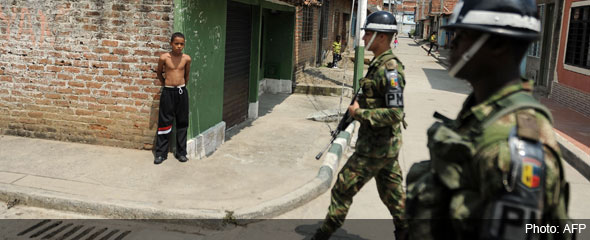
With less than 24 hours until voters hit the polling stations for Sunday’s runoff presidential election between Partido de la U’s Juan Manuel Santos and the Green Party’s Antanas Mockus, the Colombian government is urging people to trust its security guarantees and cast their ballots without fear, despite threats from the FARC in the southern part of the country.
“There have been some skirmishes, but the armed forces and the police are very well stationed at all of the key sites [around the country] and ready to repel any terrorist action,” Colombia’s Interior Minister Fabio Valencia announced on Saturday.
The minister’s reiterated the government’s security guarantees, with the deployment of more than 350,000 soldiers and police officers nationwide, comes as a response to a message sent by the FARC’s 17th Front in the department of Huila, southern Colombia.
According to 9th Brigade army commander General Henry William Torres, the guerrillas’ message, which was broadcast via a local radio station in the municipality of Pitalito, was aimed at “intimidating the population into abstaining from their right to vote.”
General Torres backed the government’s security guarantees, announcing that the army “has intensified its operations to ensure a smooth election for voters at the polls,” and that it “is important for the civilian population to not be intimidated by terrorists.”
Minister Valencia also reported that in Pitalito on Saturday, a batch of prison guard uniforms from the National Penitentiary and Prison Institute (Inspec) were stolen in what appears to be an attempt to plan a prison break operation. Valencia, however, did not attribute this incident to the FARC.
On Wednesday, Colombian authorities announced that police and military personnel would provide security to almost all of the country’s polling stations.
According to the Ministry of Defense, there will be a 99.5% coverage rate of polling stations across the country on June 20, made through a $35 million investment, which represents a coverage rate 20% higher than in the 2002 elections.
The first round of Colombia’s presidential elections, which were held on May 30, were hailed as the calmest in 40 years, with little reports of violence or disturbances.
For their part, both presidential candidates urged their supporters on Saturday to turn out to the polls in record numbers.
Mockus, speaking about his opponent, also issued a warning, saying that “Tomorrow, everything is at stake,” comparing Santos’ proposal of “national unity” to a “piece of cake” in which some people “will get big pieces, while others, very small ones.”
Santos, who is considered to be the heir of outgoing President Alvaro Uribe, has been criticized by opponents for representing a continuation of failed government policies that have polarized the Andean nation.
Mockus also urged followers to “not be consumed by fear” or scared into voting for a specific candidate, but to vote out of their own conscience. His comments alluded to recent allegations of vote-buying by the Santos campaign team, through government-run social program Familias en Accion during the first-round presidential elections. It has been suggested that families were threatened with losing their benefits if they did not vote for Santos.
“Government social programs are rights, not favors,” Mockus said.
Santos on Friday denied these allegations, explaining that “no one from [his] campaign” had organized the beneficiaries of the social program to vote for him, explaining instead that “it is logical” that people who benefited from the program would vote for him.
While Santos’ low profile on Saturday marked a stark contrast to the highly visible Mockus, he did make a brief appearance on Colombian TV, in which he called on Colombians to dedicate themselves to “defeat” abstention from voting.
On Sunday, Santos, who won 46.57% of the vote in the first round, and Mockus, who won 21.47%, will face each other in a second round, runoff election, because they both failing to get the 50% needed to secure a first-round victory.
The latest voter poll from last week showed 65% of the respondents would vote for Santos and 28% for Mockus.

